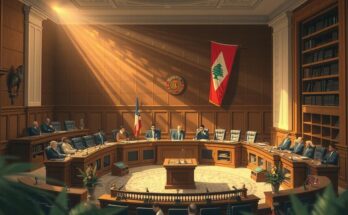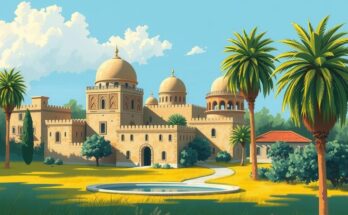Qatar is mediating peace talks between the Rwanda-backed M23 rebels and the Congolese army in the eastern DRC. The leaders of Rwanda and Congo reaffirmed commitments to a ceasefire; however, the specifics of implementation remain unclear. Qatar has a track record of mediating peace and aims to strengthen its economic ties in the region, further asserting its international presence.
Qatar is mediating peace talks aimed at resolving the conflict between the Rwanda-backed M23 rebel group and the Congolese army in eastern Democratic Republic of the Congo (DRC). Rwandan President Paul Kagame and Congolese President Felix Tshisekedi convened with Qatar’s Emir Sheikh Tamim bin Hamad Al Thani in Doha. A joint statement from Qatar’s Foreign Ministry emphasized their commitment to an immediate and unconditional ceasefire, though the implementation and monitoring processes remain unclear, and no immediate resolutions were articulated.
Beverly Ochieng, a senior associate at the Center for Strategic and International Studies (CSIS), mentioned that Qatar boasts a successful history in facilitating peace agreements. Previous attempts at mediation by the East African Community (EAC) and Southern African Development Community (SADC) have faltered, and any ceasefire agreements were invalidated prior to being enacted. Ochieng noted the significance of Qatar’s involvement, stating, “Qatar’s involvement comes as a surprise but at the same time there is a lot of precedent for Qatar being involved in various peace initiatives or dialogue initiatives.”
Tina Salama, a spokeswoman for the Congolese presidency, highlighted that Qatar was instrumental in initiating the talks as a strategic ally of both nations. Qatar’s vast investments make it a crucial partner for Rwanda. The company has considerable stakes in Rwanda’s airline and airport sectors, which underscores the growing economic relations between the nations.
Qatar is seeking to diversify its economy, heavily reliant on petroleum and natural gas. The Great Lakes region’s vast mineral resources present significant investment opportunities. Furthermore, Qatar’s developmental strategies include enhancing infrastructure projects across Africa, including modernizing airports and ports.
Diplomatic ties between Qatar and Rwanda have steadily progressed since their establishment in 2017, leading to various agreements in trade and aviation. Qatar aims to bolster its economic ties with the DRC, as evidenced by Qatar Airways’ recent expansion to Kinshasa, further enhancing air connectivity on the continent.
Muya pointed out that Qatar’s mediation in the DRC conflict is not unexpected given the close relationships cultivated in recent years. Following the recent talks, the Rwandan presidency signaled the necessity of direct political dialogue as crucial to resolving the conflict’s root causes.
Despite previous failed attempts at dialogue, regional dynamics remain tense. Ochieng described the meeting between Kagame and Tshisekedi as symbolically important amidst growing international pressure on Rwanda and its backing of the M23 rebels.
In conclusion, Qatar’s engagement in mediating peace talks in the eastern DRC represents a strategic effort to stabilize the region amid ongoing conflicts involving the M23 rebel group. With a history of successful mediation, Qatar’s involvement could potentially foster discussions that lead to a ceasefire. The strengthening of economic ties with Rwanda and the DRC aligns with Qatar’s broader strategy to assert its influence internationally. However, the actual effectiveness of these talks in bringing lasting peace remains uncertain and dependent on the cooperation of all parties involved.
Original Source: www.dw.com




